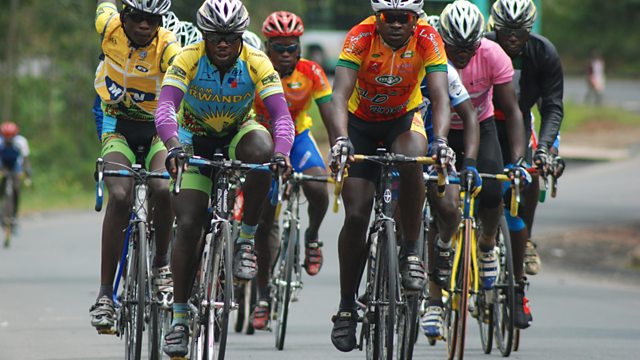Riding in Rwanda
Tim Mansel reports from Ruhengeri in the mountainous north-west of Rwanda on the cyclists who have become the nation's heroes.
Rwanda - a country known only for the genocide of 1994, when an estimated 800,000 people, mainly ethnic Tutsis, were murdered in cold blood in a mere 100 days - is also a nation in need of heroes.
It may now have found them - lycra-clad athletes in helmets and wrap-around sunglasses on $5,000 racing bikes. They are Team Rwanda, the national cycling team, its tightly packed and brightly coloured peloton now a familiar sight on their training rides on the roads around Ruhengeri in the country's north-west, not far from the border with Uganda.
For this week's Assignment Tim Mansel has spent a week with Team Rwanda as they prepare for their latest international competition. The team assembles on a Monday night from all over Rwanda. They come by bike, some after riding for three or four hours, one after a ride of six. Their week is a series of gruelling rides, nutritious food, and daily yoga, all under the critical eye of their outspoken American coach, Jock Boyer.
It's impossible to spend time in Rwanda without being confronted by the genocide, especially during the "100 days", the period between April and July when the events of 1994 are remembered. Only a few hundred yards from where the riders live is the town's genocide memorial, a walled garden dominated by a disturbing monument - the figure of a man pleading for his life and a machete that appears to be dripping in blood.
Team Rwanda is not immune from the genocide, indeed it makes explicit connections. Its website features biographies of several of its riders: Rafiki Uwimana, a small child in 1994, sent by his parents to live in the countryside to escape the horrors of the capital Kigali, forced to hide in the forest from the Hutu militias, and almost dying of malaria before being saved by the Tutsi RPF militia invading from Uganda; or Obed Rugovera, who lost three siblings and two uncles in the carnage.
"The genocide has affected every one of the riders profoundly and you can feel it even without talking about it," says the coach, Jock Boyer. "Cycling... gives them the hope that they can buy a house, provide for their family, do something they're good at and that they're recognised for and that the country is not just going to be known for a genocide."
(Image: Cyclists from Team Rwanda. Image by Tim Mansel, 麻豆社)
Last on
More episodes
Previous
Broadcasts
- Thu 2 Aug 2012 08:05GMT麻豆社 World Service Online
- Thu 2 Aug 2012 12:05GMT麻豆社 World Service Online
- Thu 2 Aug 2012 15:05GMT麻豆社 World Service Online
- Thu 2 Aug 2012 19:05GMT麻豆社 World Service Online
- Fri 3 Aug 2012 01:05GMT麻豆社 World Service Online
- Sat 4 Aug 2012 03:05GMT麻豆社 World Service Online
- Sun 5 Aug 2012 16:05GMT麻豆社 World Service Online
- Sun 5 Aug 2012 21:05GMT麻豆社 World Service Online
Download this programme
Subscribe to this programme or download individual episodes

